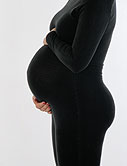- The Best Time of Day to Drink Bone Broth to Maximize Health Benefits
- 8 Ways to Increase Dopamine Naturally
- 7 Best Breads for Maintaining Stable Blood Sugar
- Gelatin vs. Collagen: Which is Best for Skin, Nails, and Joints?
- The Long-Term Effects of Daily Turmeric Supplements on Liver Health
- Could Your Grocery Store Meat Be Causing Recurring UTIs?
- Are You Making This Expensive Thermostat Error This Winter?
- Recognizing the Signs of Hypothyroidism
- 10 Strategies to Overcome Insomnia
- Could Artificial Sweeteners Be Aging the Brain Faster?
Antidepressants During Pregnancy Have Benefits, Risks: Study


Women with a mental health disorder taking commonly prescribed antidepressants during pregnancy appear to have fewer delivery complications, a new study suggests.
However, babies born to these women may have a higher risk of problems, such as breathing issues, the study said.
“Our findings provide evidence that taking these antidepressants is associated with a lower risk of preterm birth and cesarean section, and further confirm the results from previous research of a higher risk for several neonatal problems,” senior study author Dr. Alan Brown, a professor of psychiatry and epidemiology at Columbia University in New York City, said in a university news release.
“Given these divergent findings, the decision whether to prescribe these medications during pregnancy should be individualized to the mother’s medical and psychiatric history,” he said.
The researchers looked at data from more than 845,000 single births in Finland between 1996 and 2010. Nearly 13,000 of these women had filled at least one prescription for a selective serotonin reuptake inhibitor (SSRI) antidepressant during their pregnancy, the researchers said.
SSRI antidepressants are commonly used to treat depression and anxiety during pregnancy. Between 4 percent and 10 percent of pregnant women are prescribed these medications in the United States and Finland, the researchers said.
Some widely used SSRIs include citalopram (Celexa), escitalopram (Lexapro) and fluoxetine (Prozac).
Pregnant women who used SSRIs were 16 percent less likely to have a preterm birth and nearly 50 percent less likely to have a very preterm birth than those who were diagnosed with a mental health disorder but didn’t take SSRIs, the investigators found.
The risk of cesarean delivery was 26.5 percent among women with a diagnosed disorder who did not take SSRIs, the findings showed. C-section rates were 17 percent for women with no diagnosis of mental health issues and those with a diagnosis who took SSRIs.
Taking SSRIs didn’t change the risk of being born small for gestational age. But, the use of antidepressants was associated with increased risk of all neonatal problems — including breathing issues — that resulted in longer hospital stays.
The study was published online recently in the American Journal of Psychiatry.
“To our knowledge, the association between taking antidepressants in pregnancy and a lower risk of preterm birth is a novel finding,” Brown said. “Up to now, studies which were based on maternal underlying psychiatric illness had small sample sizes and reported inconsistent results,” he added.
More information
The U.S. Office on Women’s Health has more about pregnancy and medicines.
Source: HealthDay
Copyright © 2026 HealthDay. All rights reserved.










